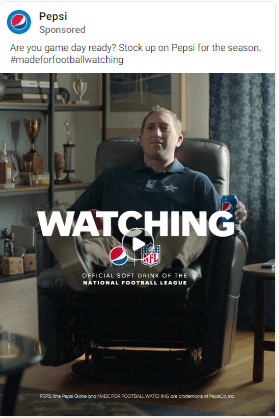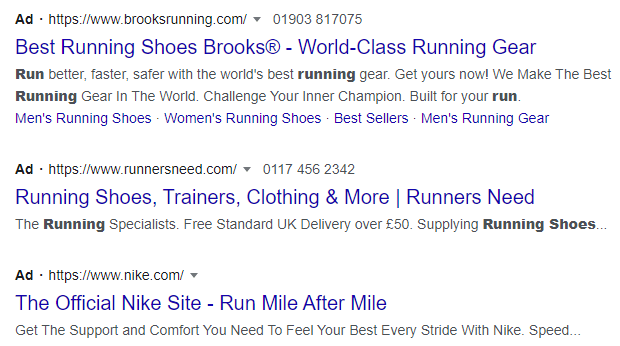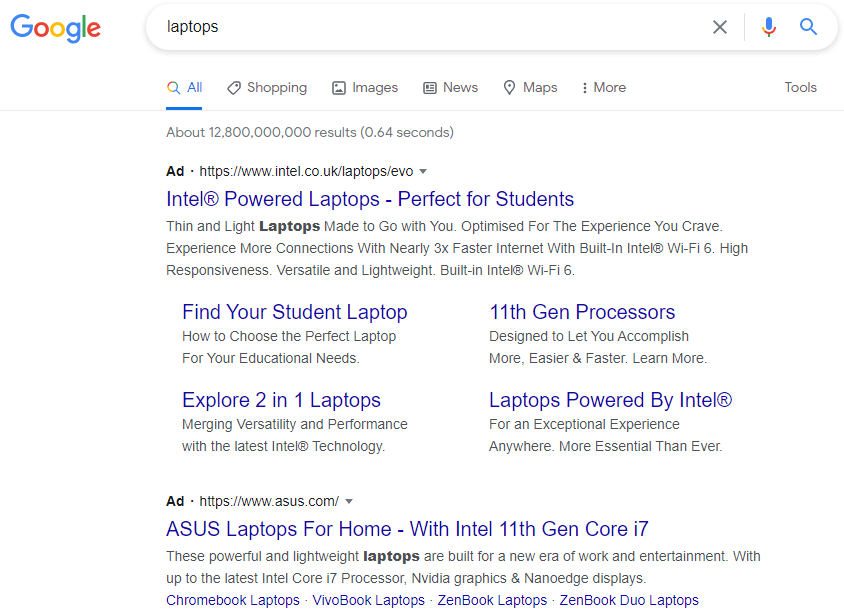-
 Published: Nov 3, 2021
Published: Nov 3, 2021
-
 7 min. read
7 min. read
-
 Abby Fields
Abby Fields Branded Content Specialist
Branded Content Specialist
- Abby is a data-driven content marketer with certifications in inbound marketing and content marketing. She’s written hundreds of articles covering digital marketing topics — a few of her specialties include first-party data, marketing and data analytics, marketing strategy optimization, and SEO. When she isn’t writing or optimizing content, Abby loves to spend time reading the latest mystery novel, having movie marathons with lots of snacks, and jamming out to Shania Twain.
With billions of people using search engines and social media to browse, research, and purchase products and services, paid social and paid search ads can help attract more consumers and sales for your business.
But what’s the difference between paid social vs. paid search, and how do you know which one will drive the most revenue for your business?
On this page, we’ll compare paid social and paid search ads and evaluate which one could be the best fit for your business.
And if you’re looking for even more digital marketing advice, sign up for our newsletter, Revenue Weekly, to get the latest digital marketing tips and strategies sent straight to your inbox!
What is the difference between paid social and paid search?
The difference between paid social and paid search is the ad network, which determines where ads appear, what format they take, and how ad performance is measured. Advertisers can use paid social and paid search ads to reach users in different stages of the funnel, from awareness to consideration.
Want to learn the difference between paid marketing and non-paid marketing tactics?
Watch the video on earned vs. paid vs. owned media below!
What is paid social?
So, what is paid social? Paid social is the practice of promoting your products and services through paid advertisements on social media platforms. With this digital advertising strategy, you can pay to advertise your brand to more consumers on social media.

Your ad will appear on users’ newsfeeds so they can view your products and services while scrolling through their daily updates.
Paid social is an excellent strategy that helps you reach more members of your target audience on social media.
What is paid search?
Paid search is the process of paying for advertisements that display at the top of search engine result pages (SERPs), typically on Google. Paid search ads generally are pay-per-click (PPC) advertisements that display above organic search results.

With 93% of online experiences beginning with search engines, paid search ads are an excellent way to promote your brand to more consumers and increase brand awareness for your business.
Paid social vs. paid search: What’s the difference between paid search and paid social advertisements?
Now that you know the answer to “what is paid search and paid social,” we can compare these two types of online advertisements.
So, what exactly is the difference between paid search and paid social ads? Several factors make these ads different, including:
1. Ad formats
One of the most significant differences between paid social and paid search ads is their format and appearance. While both paid search and paid social are digital advertisements, how they appear to users can differ.
Paid search ads will usually appear at the top of the search results page when a user searches for a keyword or phrase. This means that paid search ads are mostly text-based because they look similar to the other organic search results.

On the other hand, paid social ads appear on a user’s newsfeed, and you can usually have more freedom to choose what you want your ad to look like.
You can choose from eye-catching images, intriguing videos, a paragraph of text, or a combination of the three.
2. Targeting features
Another key difference between paid social vs. paid search is their targeting ability. While both paid search and paid social ads allow you to target specific consumers, how they do this is a little different.
Many social media platforms allow you to target consumers based on several factors, including age, interests, and location. These targeting features will enable you to customize your paid social ads to promote your brand to users who will find your ads interesting and relevant.

With paid search ads, you can also target consumers by their demographics and interests.
However, paid search ads also enable you to target consumers by the keywords and phrases they use when conducting a search.
You may have to do keyword research to successfully identify which words and phrases your target audience is searching for. You can then bid on these keywords to display your paid search ads at the top of the SERPs each time a user searches for those words or phrases.
3. User intent
The last difference between paid social and paid search ads they each satisfy different user intents. When consumers use search engines and social media, they often use them for different reasons.
For search engines, users are typically searching for answers or solutions to a particular query or researching a specific topic to learn more information. That means your paid search ads can directly help consumers find the information and answers they are searching for, satisfying their search intent.
On the other hand, most users scroll through their newsfeed to see news and updates from other users, brands, celebrities, and more.
They might not be actively searching for a solution or answer to a query.
As a result, your paid social ads can help users learn more about your brand and your products and services without them having to do much research on their part.
Paid social vs. paid search: Which is better for your business?
So now that we’ve gone over the difference between paid search and paid social, you might be wondering which one is best for your business.
Deciding which one is right for your business can depend on several factors, including your business goals and marketing budget.
Paid search
You might want to consider paid search if you have the following goals in mind:
- You want to see results as fast as possible
- You want to customize your ad spending
- You want to increase your online visibility in search engines
- You want to reach members of your target audience on search engines like Google
If you want to increase your presence in the SERPs and earn more web traffic and clicks by providing solutions and answers to your target audience’s pain points and questions, then paid search could be right for your business.
Paid social
You might want to consider paid social if you have the following goals in mind:
- You want to create emotional and more engaging ads that will resonate with your target audience
- You want your ads to contain more visual elements, such as photos and videos
- You want to reach more consumers on social media platforms
If you want to increase your brand awareness on social media platforms and create more targeted and relevant ads for social media users, then paid social could be the best option for your business.
However, if you want to maximize your revenue and sales, we recommend a combination of both paid social and paid search ads.
When you use a mixture of both, you can reach more consumers in your target audience on both search engines and social media platforms. And as a result, you’ll be able to create more custom and personalized marketing messages that can help you increase your online visibility and drive conversions and web traffic for your business.
If you want to boost your revenue as much as possible, using both paid social and paid search advertisements is a must.
“Working with WebFX, everything is very organized and strategic. We’re only a year into our partnership, and our expectations have definitely been met.”93% of WebFX customers are extremely satisfied with their digital marketing results.


Increase your sales and revenue with paid advertising services from WebFX
Did you know that WebFX is a leading digital advertising agency? If you’re looking to step up your digital marketing campaigns with paid social and paid search ads, our experts can help.
Our award-winning team has generated more than $6 billion in revenue and more than 24 million leads for our clients through our top-tier paid social and paid search services.
We can create, implement, and manage custom paid advertisements to help you achieve your business goals.
What’re you waiting for? Get in touch by calling 888-601-5359 to speak with one of our strategists, or contact us online to learn more about how our paid advertisements can boost revenue and sales for your business.
-
 Abby is a data-driven content marketer with certifications in inbound marketing and content marketing. She’s written hundreds of articles covering digital marketing topics — a few of her specialties include first-party data, marketing and data analytics, marketing strategy optimization, and SEO. When she isn’t writing or optimizing content, Abby loves to spend time reading the latest mystery novel, having movie marathons with lots of snacks, and jamming out to Shania Twain.
Abby is a data-driven content marketer with certifications in inbound marketing and content marketing. She’s written hundreds of articles covering digital marketing topics — a few of her specialties include first-party data, marketing and data analytics, marketing strategy optimization, and SEO. When she isn’t writing or optimizing content, Abby loves to spend time reading the latest mystery novel, having movie marathons with lots of snacks, and jamming out to Shania Twain. -

WebFX is a full-service marketing agency with 1,100+ client reviews and a 4.9-star rating on Clutch! Find out how our expert team and revenue-accelerating tech can drive results for you! Learn more
Try our free Marketing Calculator
Craft a tailored online marketing strategy! Utilize our free Internet marketing calculator for a custom plan based on your location, reach, timeframe, and budget.
Plan Your Marketing Budget
Table of Contents
- What is the Difference Between Paid Social and Paid Search?
- What is Paid Social?
- What is Paid Search?
- Paid Social vs. Paid Search: What’s the Difference Between Paid Search and Paid Social Advertisements?
- Paid Social vs. Paid Search: Which is Better for Your Business?
- Increase Your Sales and Revenue with Paid Advertising Services from WebFX

Maximize Your Marketing ROI
Claim your free eBook packed with proven strategies to boost your marketing efforts.
Get the GuideTry our free Marketing Calculator
Craft a tailored online marketing strategy! Utilize our free Internet marketing calculator for a custom plan based on your location, reach, timeframe, and budget.
Plan Your Marketing Budget





